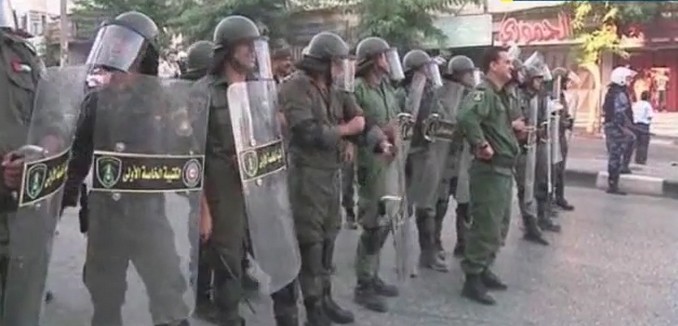Both the Palestinian Authority and the terrorist organization Hamas are intimating journalists in order to stifle negative coverage ahead of local and municipal elections, veteran Palestinian affairs correspondent Khaled Abu Toameh reported on Tuesday.
Both groups have placed journalists at the top of their “hit-lists” in an effort “to silence critics in the West Bank and Gaza Strip,” Abu Toameh wrote. Neither “tolerates a free and independent media — especially on the eve of a crucial election that could have far-reaching political implications in the Palestinian arena,” he observed.
A loss to Hamas in the scheduled October 8 elections would be “catastrophic for President Mahmoud Abbas and his Palestinian Authority,” as it would be the equivalent of “a vote of no-confidence in their policies and performance,” Abu Toameh continued. Hamas, for its part, fears an electoral defeat as it “would undermine its power in the Gaza Strip and pave the way for its collapse,” he noted.
Abu Toameh cited the case of Ahmed Said, a Gaza-based journalist who was arrested and had his computer confiscated by Hamas last week. Said hosts a call-in radio show in which locals “voice their grievances and talk openly about the problems they are facing under Hamas rule in the Gaza Strip,” Abu Toameh explained. Prior to his arrest, Said phoned Ayman Al Batnihi, a spokesman of the Hamas police force, to discuss the recent rise in murders in the territory. According to Said, Al Bathini threatened him, saying, “You are causing us a lot of problems and inciting people. I know how to deal with people. You need to be hanged.”
Said’s arrest follows that of Mahmoud Abu Awwad, a reporter for the Palestinian daily Al-Quds who was arrested by Hamas on July 25. He hasn’t been allowed to see his family while in prison, and both his computer and mobile phone have been confiscated.
According to Hamas, Abu Awwad was arrested for “security reasons.” However, his father told Al-Quds that “Hamas is trying to spread lies to distort the image of my son and justify his arrest.” He added that his son “was arrested because he was critical of the situation in the Gaza Strip and the Hamas government.”
Abu Toameh observed:
Said and Abu Awwad have something in common. Both journalists made the mistake of reporting on the suffering of Palestinians living under Hamas rule. These are not the kind of stories that Hamas wishes to see ahead of the local and municipal elections. Rather, Hamas wants to see printed lies of prosperity.
Hamas recently published a video showcasing new houses in Gaza in order “to persuade Palestinian voters that life under Hamas is the best thing that could ever happen to them,” Abu Toameh wrote. The Islamist group hopes this public relations campaign will help it win control over more territory in the upcoming elections, if journalists like Said and Abu Awwad don’t ruin things “with their inconvenient truths,” he added.
Hamas’ rival, the PA, has been just as concerned with censoring bad news that could damage its prospects in the elections. “In recent weeks, the crackdown on journalists in the West Bank seems to have increased in light of the upcoming elections,” Abu Toameh noted. The apparent goal is to prevent “any journalist who might harm its loyalists’ chances of winning the local and municipal vote” from reporting, he wrote.
Abu Toameh pointed to the case of Mohamed Abu Khabisah, who covers economic affairs for the Turkish news agency Anadolu. Abu Khabisah was recently arrested in the middle of the night by Palestinian security forces, who also confiscated his computer and documents. According to Palestinian sources, Abu Khabisah — the sixth reporter arrested by the PA since the local elections were announced — was targeted because he was investigating financial corruption at Wafa, the PA’s official news service.
Abu Toameh described the crackdowns by Hamas and the PA as a sign of their insecurity about the upcoming elections:
The “security reasons” they tout as an excuse for their repression is a foil for their sense of instability: the less politically secure they feel, the more they strip Palestinian journalists of their ability to report how things really stand in the Gaza Strip and the West Bank.
The repression of journalists has long been a problem in the Palestinian territories, which received an unfavorable press freedom score of 84 (with 100 being the worst) from Freedom House in 2015. A survey released by the Palestinian Center for Development and Media Freedoms in 2014 found that “80% of Palestinian journalists in the West Bank and Gaza practice self-censorship of their writing.” A poll published that same year by the Palestinian Center for Policy and Survey Research found that 70 percent of Palestinians did not feel that they could criticize the PA.
Grant Rumley, a research fellow at the Foundation for Defense of Democracies, warned in May that the West’s refusal to challenge the growing corruption and autocratic rule under Abbas “could have a devastating effect on the long- prospects for a viable Palestinian state.”
[Photo: JewishNewsOne / YouTube ]




